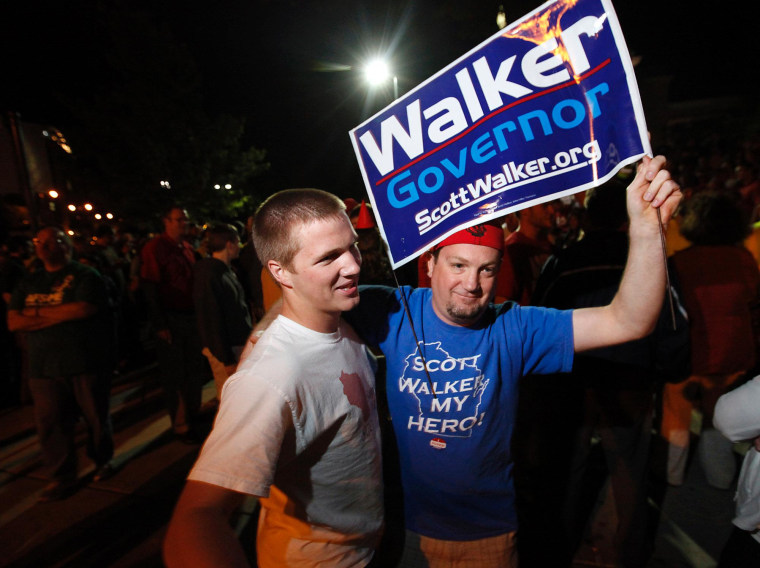Many of us modern American consumerists have something they have spent hundreds, even thousands of dollars to keep things just the way they are. Perhaps you've paid off a tax bill, or back rent just so you can remain quite literally where you are in life. Maybe you've spent a ton on a new course your employer suddenly required that you take in order to keep your job -- or doled out thousands on a new car to replace the old one that finally broke down on you, just so you can keep your normal routine. The free market happily provides for those sudden needs, and whether we approach the cash register with our head hanging low or not, we are often subject to paying to stay on target, to stay exactly where they are.
Scott Walker's governorship of Wisconsin -- and those funding his effort to keep that job -- have both been about anything but keeping the status quo. As we noted yesterday, Walker and his fellow newbie Republican governors has been about creating a "new normal" not just in Wisconsin, but for the Republican Party as a whole. But three exit polls from last night's election seem to indicate that Wisconsin voters may have kept Walker around simply because they're more comfortable with that "new normal" than the "new."
According to interviews done with Edison Research and published in The New York Times, 38% of union households voted for Walker, a guy who has earned the label of "union-stripper" from critics. On the flipside, 18% of Walker voters plan to head to the polls in November and vote to re-elect Barack Obama, a point Salon's Steve Kornacki underscored -- so a lot of folks want to keep Walker and President Obama.
The last one was the most important, I think. Jamelle Bouie wrote about it today in the Washington Post:
For 60 percent of last night’s voters, a recall is only acceptable in cases of offical misconduct. For 10 percent, a recall is never acceptable. It’s not that these voters are pro-Walker, pro-Obama as much as they are pro-Obama, anti-recall. To them, this is a question of stability — “how are we supposed to govern a state if a governor can be deposed for controversial policies?” You may not like Walker — and see him as a dangerous ideologue — but it’s a fair point.
Bouie, in the same post, highlights how much of the political media is misreading Walker's win, describing alarmist headlines and stories that have spouted up since NBC News called the race last night. It speaks volumes that there were political journalists, prior to the election, predicting that pundits would screw this up. (Myself, I'm waiting for the trend piece alleging that the woman slapping Democratic challenger Tom Barrett after his loss last night is a signifier of Democrats' tendency to self-destruct.)
Republicans themselves are doing their share of getting it wrong today, seeking to give their victory national meaning, despite its lack thereof. Most hilariously, Mitt Romney's senior advisor in Florida tweeted this:
Kevin Drum of Mother Jones nails it with his breakdown of exactly why Republicans are doing that:
Here's why: Politics in the United States is a game played on multiple levels, and ideology is only the first. Walker was playing on a second, deeper level, where the issues are secondary. Here, the goal is not so much to advance one party's agenda, but to actively undermine the infrastructure that allows the opposing party to exist at all. And on this level, one of America's two political parties routinely outplays the other: Defunding the left is a longtime goal of the smartest and savviest Republican strategists, and they've pursued it for decades.
This is nothing new, folks. As last night's recall election reminds us, regardless of party, the familiar remains awfully popular.
Postscript: Brentin Mock notes in Colorlines that one interesting and under-reported development from the Walker recall election: turnout for both young voters and African American voters was up. Find out more here.
